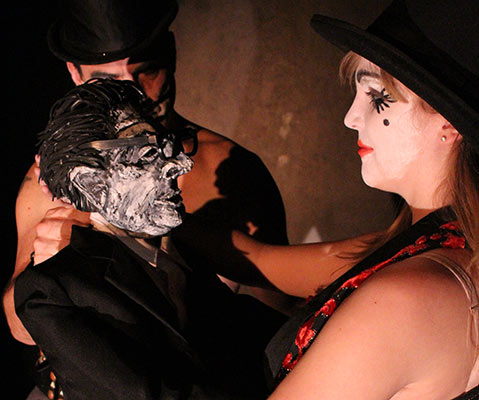Review: La La La Strada at Center Stage Theater
Fellini Took the Stage as a Puppet on February 22

Confidently blending documentary, drama, original music, and puppetry, La La La Strada brings the cinematic world of Italian film director Federico Fellini to life onstage as a fully satisfying and consistently insightful evening of theater. The script, which was devised by actor/director Jeff Mills in collaboration with his ensemble cast, tracks the process by which Fellini completed one of his early masterpieces, La Strada (1954). Using a remarkably effective puppet designed by Christina McCarthy to portray Fellini, the show’s cast members re-create scenes from the film interspersed with memorable episodes from its making. Dillon Yuhasz and Jeff Mills take turns speaking most of Fellini’s lines, and the contrast between their voices winds up reinforcing the sense that this charming and difficult man contained multitudes. As Zampanò, the brutish strongman portrayed by Anthony Quinn in the original film, Mills delivers a bold and winning portrayal of a sexist pig, no small feat, especially given the counterpoint provided by the presence of not one but five excellent women in the cast.
The largest share of Zampanò’s abuse falls to Gelsomina, his traveling companion and highly indulgent lover in the La Strada story. According to multiple sources, including the actress herself, the role of Gelsomina was the most difficult part that Fellini ever asked his wife, Giulietta Masina, to play. In La La La Strada, Blythe Foster raises Gelsomina above any shadow of clichéd masochism, finding the poignancy in her character’s desperate need for attachment. And, despite the hurtful content of these scenes, she and Mills are a joy to watch working together. Genevieve Anderson plays the part of the older Giulietta Masina, who takes her husband to task both for his wayward affairs and for the harshness of his treatment of her on the set. As Rosa, Gelsomina’s older sister in La Strada, Erica Flor provides yet another bewitching female presence in Fellini/ Zampanò’s web of seduction and betrayal. Dana Fox Ortner shifts easily between her female ensemble roles and the part of Tullio Pinelli, the aggrieved screenwriter of La Strada who appears from time to time to register his disapproval of the director’s aspiration to auteur status.
Beginning with the highly effective use of the puppet, the play employs multiple strategies for representing the story, ranging all the way from naturalistic acting to circus-like prop work and highly physical stage combat, dance, and tumbling. It’s a delight to see dancer Christina McCarthy inhabit her roles so vigorously; her turn as Il Matto, Zampanò’s sweet-mannered and unlucky rival for Gelsomina, will break your heart.
It may be worth seeing La La La Strada more than once to fully appreciate the extent of its artistry. The cumulative impact of the ensemble is quite seamless; together the actors weave a total — and totally bizarre — world. For example, as the voice of Fellini, Yuhasz mixes wheedling manipulation, overbearing egotism, and genuine charm until its impossible to tell them apart. His insinuating performance in turn draws the others, including Zampanò, into the maestro’s eccentric orbit. Jim Connolly’s music goes well beyond the traditional role of the score in a play, integrating fully with the performances and becoming part of the action. Fans of Fellini will already have marked this show on their calendars; fans of innovative theater should follow them to Center Stage for one of the remaining performances.



